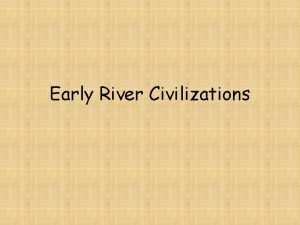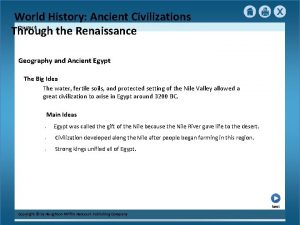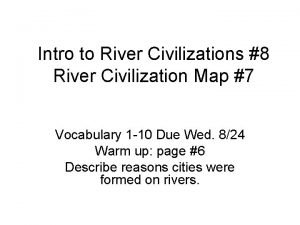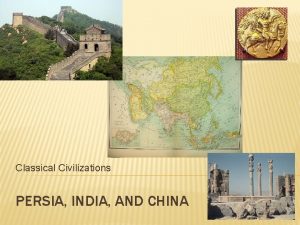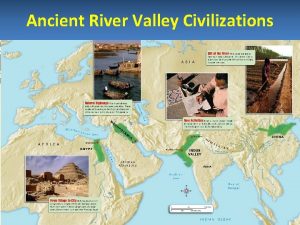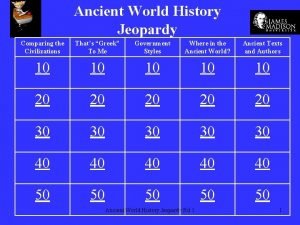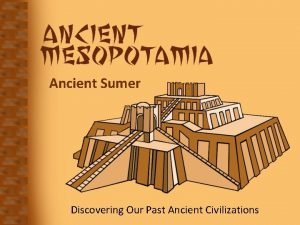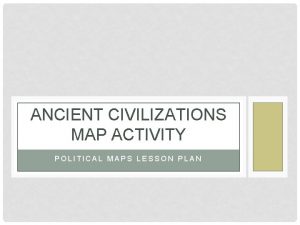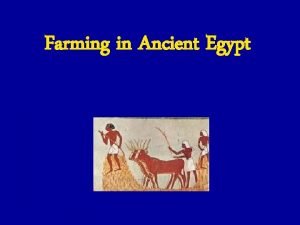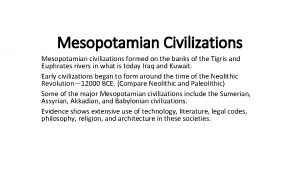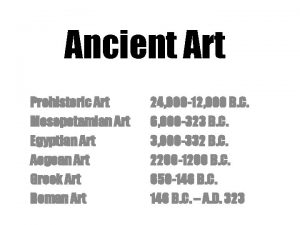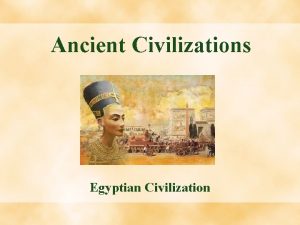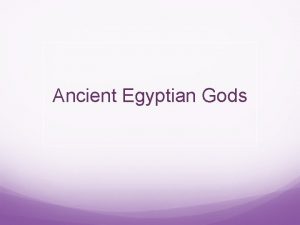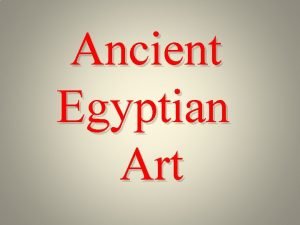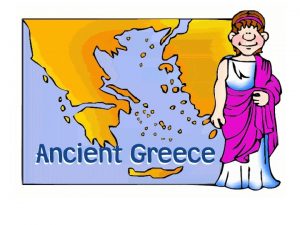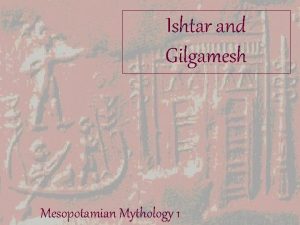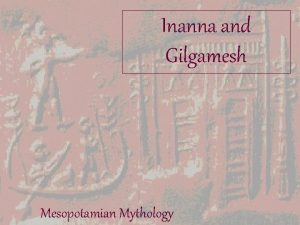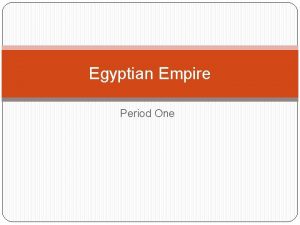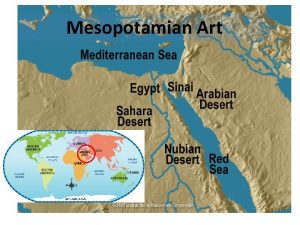The Ancient World Prehistoric Mesopotamian and Egyptian Civilizations













- Slides: 13

The Ancient World: Prehistoric, Mesopotamian, and Egyptian Civilizations

First Humans ca. 300, 000 B. C. E. – Neanderthal ca. 200, 000 B. C. E. – Homo sapiens in Africa; 35, 000 years ago established in Europe 1. 2. 3. 4. Made tools Cooked with fire Buried dead in ritual ceremonies Worshiped forces of nature

Paleolithic (Old Stone Age) ca. 35, 000 - 10, 000 B. C. E. (corresponds with geological Ice Age) Cave art: Lascaux, France (fig. 1. 1) – bulls, humans, etc. , painted in deeper parts of caves not used for living Portable art: Woman of Willendorf (fig. 1. 2)

Neolithic (New Stone Age) ca. 8000 -2300 B. C. E. Megalithic structures – Stonehenge (fig. 1. 4), a post-and-lintel structure, perhaps a calendar

Bronze Age ca. 2300 -1000 B. C. E. Began to cultivate the land Civilization in Mesopotamia

Mesopotamia Present-day Iraq The arts, writing, and law flourished Empires dominated the Near East and northern Africa

The Sumerians ca. 3500 B. C. E. First people to use writing (cuneiform) Constructed monumental buildings: Ziggurats – stepped pyramids Literature: Epic of Gilgamesh, which tells of a Great Flood also recounted in the Hebrew Bible Religion: polytheism

Empires of the Ancient Near East Akkadians: the Victory Stele of Naram. Sin (fig. 1. 8) Babylonians: Law code of Hummurabi (Stele, fig. 1. 9) Assyrians: conquered lower Egypt 1. Ashurbanipal 2. Nebuchadnezzar II – Ishtar Gate (fig. 1. 13) Persians: Darius’ palace at Persepolis (fig. 1. 14). Persepolis later fell to Alexander the Great

Egypt: Religion and Society Pharaoh, or king, was living embodiment of a god Rest of society stratified Polytheistic Belief in the immortality of the spirit Treasures buried with mummified dead to insure happiness after death

The Arts of Egypt Architecture 1. Great Pyramids of Giza (fig. 1. 2) 2. Funerary Temple of Queen Hatshepsut (fig. 1. 24) 3. Temple of Amen-Mut-Khonsu (fig. 1. 25) Sculpture 1. The Great Sphinx (fig. 1. 21) 2. King Menkaure and Queen (fig. 1. 22) 3. Four Seated Figures of Ramesses II (fig. 1. 27)

The Arts of Egypt Painting 1. House and Garden of the Scribe Nakte (fig. 1. 26) 2. Nobleman Hunting in the Marshes (fig. 1. 28) 3. Musicians and Dancers (fig. 1. 29)

Rulers of Egypt Akhenaten: cult of the god Aten 1. Established court at Amarna with his queen Nefertiti 2. Rule noted for new intimacy in the pictorial depiction of humans (fig. 1. 30) Tutankhamen: restored cult of Amon-Re Ramesses II: monumental, richlydecorated tombs

Decline of Egypt Kush empire Assyrians Persians Alexander the Great: Hellenistic culture
 English georgian period floral design
English georgian period floral design River valley civilizations map
River valley civilizations map Ancient civilizations through the renaissance
Ancient civilizations through the renaissance Yellow river civilization map
Yellow river civilization map Chapter 9 lesson 1 early civilizations
Chapter 9 lesson 1 early civilizations The two classical civilizations of ancient india were the
The two classical civilizations of ancient india were the Ancient river valley civilizations powerpoint
Ancient river valley civilizations powerpoint World history jeopardy
World history jeopardy Discovering our past ancient civilizations
Discovering our past ancient civilizations Four corners of civilization map
Four corners of civilization map Egyptian kalasiris
Egyptian kalasiris Ancient egypt transportation
Ancient egypt transportation Floristry history
Floristry history Ancient egypt agriculture
Ancient egypt agriculture

